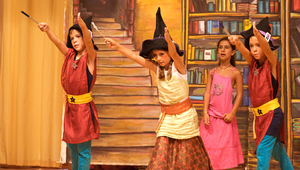“Creativity is a basic quality of all living systems. It unfolds in a combination of talents, knowledge, skills, intrinsic motivation and a supportive environment (…) the meaning of the root word creare – create something new, create, compose.” (Wikipedia)
Creativity seems to be a quality that cannot be achieved by straining one’s thinking in order to solve a specific problem. Really creative ideas mostly come to us when we manage to use our brain without pressure or excessive focus.
The capacity for associative and creative thinking is an essential prerequisite for effective learning. This is true not only for the so-called ‘creative areas’ of art, theatre, music, poetry, dance, etc., but for all learning domains and especially for the more linear-logical fields of mathematics and science and for all language areas. For example, in creative ‘writing workshops’ the rules of grammar are learned though play and in a highly motivated manner. In our creative projects, such as theatre, break-dancing and art, we have seen students grow immensely over the years. The increasing skill in creative self-expression leads to an increase in self-esteem. This growth in ‘self-appreciation’ results in an enthusiasm to learn in all other areas. The children and young people feel that their intrinsic interests and potential are recognised. This creates trust between students and teachers which is an important basis for a self-motivated and proficient learning.
The Escola da Esperança creates a learning environment that enables creative, free and engaged learning. In the ‘internal school curriculum’ modules have been developed to complement the basic curriculum for this purpose.
Prof. Dr. Burow, from the Department of General Education at the University of Kassel (Germany) has developed the concept of the ‘creative field’: “Sustainable schools that turn into places of wellbeing, which want to promote the happiness of their students, must be places of free learning and developing. They should concentrate on recognizing the inner calling of their students and provide diverse teaching and learning environments which gradually lead to self-organized and self-directed learning (…) According to the formula, ‘I am good – we are better’, with the right mix in the group and the right attitude of the team members, every person and every institution can design ‘creative fields’ and thus contribute to outstanding new creations “. (Burow 2011- Positive Education p.131)


